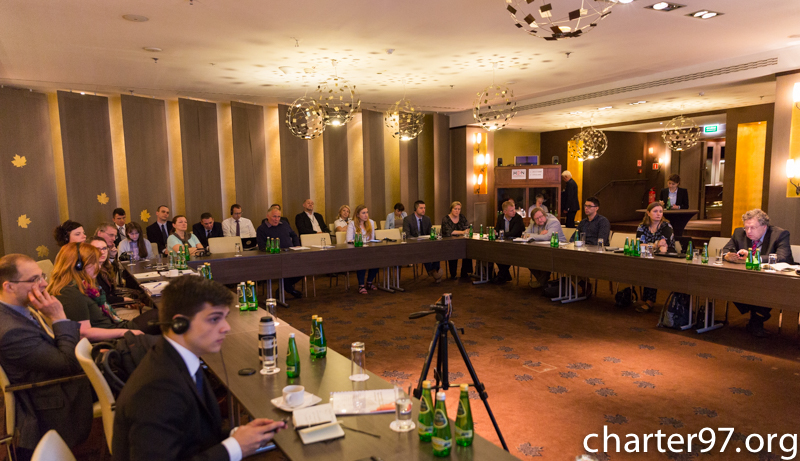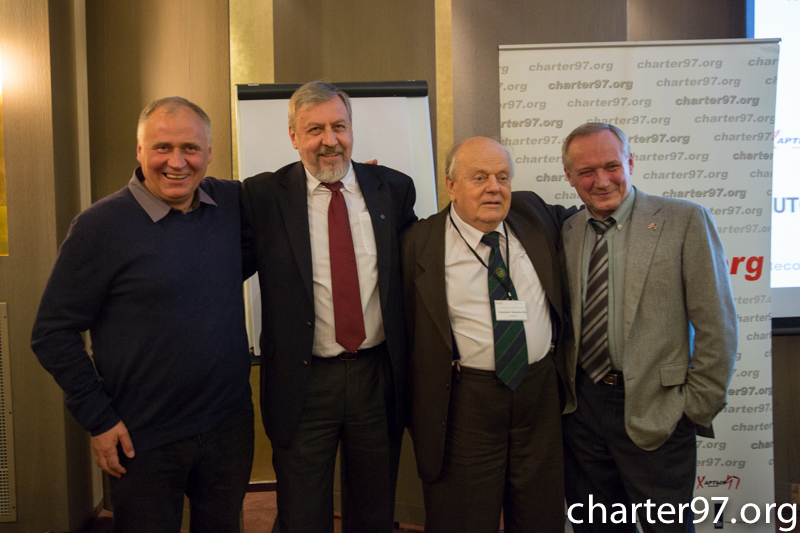It Is Time To Defend European Values
16- 27.05.2016, 7:33
- 19,310
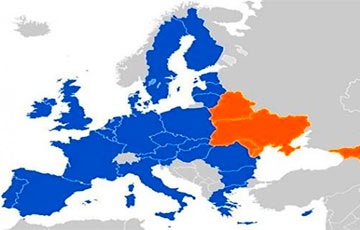
In order to counter the Eurasian threat, it is necessary to help the Belarusian democracy.
The conference entitled “Autocratical challenge for the European project - what to do and not to do” was held on May 25th in Warsaw. The event with the participation of leading experts from Belarus, Ukraine, Poland, Czech Republic, Slovakia, Hungary and Germany was organized by the „Charter-97” and took place in the framework of the project „Eurasian challenge for Eastern Europe”, supported by the Visegrad Fund.
The conference was opened by the first leader and head of the state of independent Belarus - Stanislau Shushkevich.
Stanislau Shushkevich has noted in his speech that he does not share the current EU’s policy towards the regime in Belarus and that he is glad that Warsaw hosts a conference, where these approaches are criticized and alternatives of Western policy are proposed.
“We know that only we, Belarusians, can change the situation in our country. But today we need help, solidarity and support. There is no need to humiliate Belarusian opposition by giving intrusive tips of what to do. Just stop saving Lukashenko’s dictatorship by giving credits and removing sanctions. It is better to help the independent media and civil society”, - Shushkevich said.
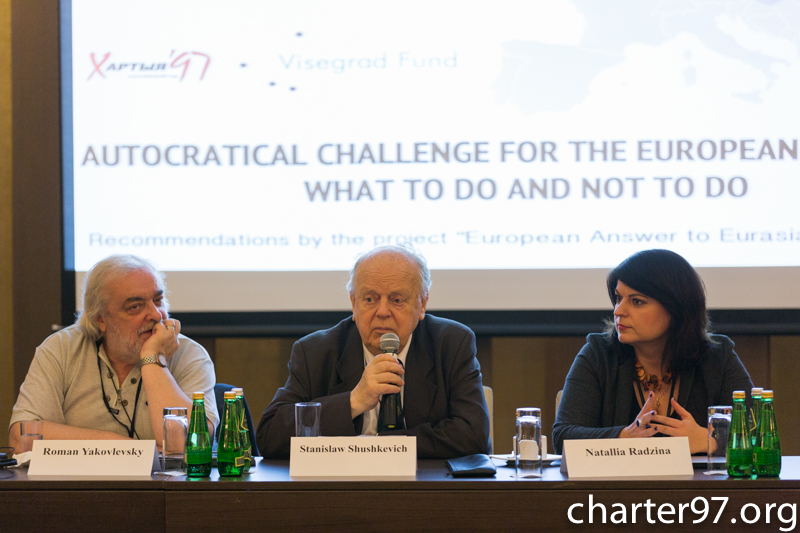
Introducing the project, the chief editor of charter97.org Natallia Radzina said:
“Eurasian challenge for Eastern Europe” - is a serious topic that, unfortunately, is becoming increasingly important. We are grateful to the Visegrad Fund for the support of this project and also for the fact that within a year, experts of leading analytical centers of the Visegrad countries, as well as the Belarusian, Ukrainian and Russian political scientists discussed in depth the challenges for Eastern Europe and provided appropriate advice for the EU.
The site “Charter-97” had the honor to publish these materials, bringing them to a wider audience, primarily for countries located at the forefront of calls coming from the East.
Many analysts from Europe understand what is happening in Belarus and how wrong and dangerous the new (old) EU’s policy towards the Lukashenko’s dictatorship is; moreover, they share their views on the geopolitical situation in the region. I hope that this project is the first one and there is a lot of really important and interesting work ahead of us.”
The chief editor of charter97.org has named the participants of the project: the Foundation “Charter-97” (Belarus - Poland); the Institute of Public Affairs (Poland) and its president Jacek Kucharczyk and analyst Łukasz Wenerski; the Slovak Institute of Public Policy and its director Grigory Mesezhnikov; Slovak organization M.E.S.A.10 and its president Ivan Miklos, a great friend of Belarus, ex-Foreign Minister of Slovakia Pavol Demes; Czech Institute for European Policy EUROPEUM and its president Vladimír Bartovic; International Centre for Democratic Transition (ICDT) and its president Istvan Gyarmati; Ukrainian “Center for Social and Business Initiatives” (Ukraine), „Maidan of Foreign Affairs” (Kyiv) and its director Bohdan Yaremenko, Ukrainian East European Security Research Initiative Foundation and its head Maksym Khylko; Foreign Policy Research Institute by the Diplomatic Academy of Ukraine of Ministry of foreign affairs represented by Oleksandr Tytarchuk; Freedom Files Fund (Russia - Poland) and its managers Olga Zakharova and Yuri Dzhibladze; Experts from Belarus - Roman Yakovlevsky, Leonid Zlotnikov, Irina Khalip, as well as politicians that attended the conference within the project - Stanislau Shushkevich, Mikalai Statkevich, Andrei Sannikov, Zmitser Bandarenka. The project coordinator is Uladzimir Kobets.
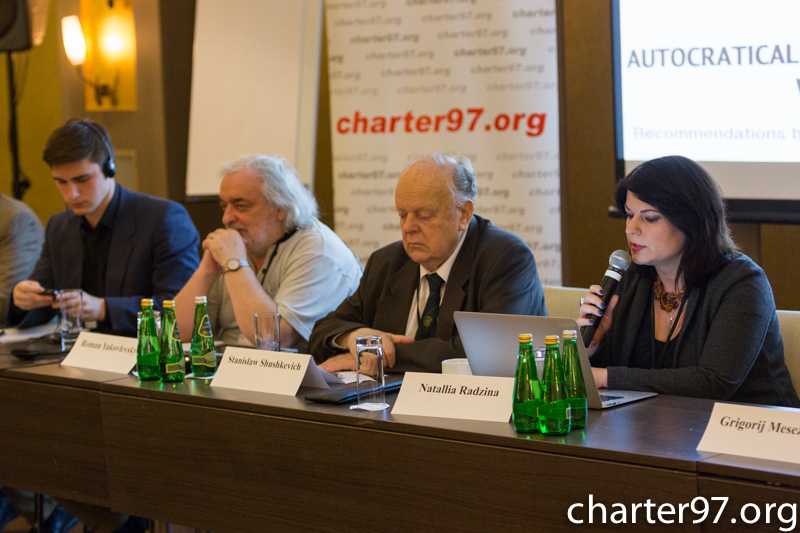
Below, we are presenting the excerpts of the discussion that was held with the participation of experts.
Andrei Sannikov: A lot can be achieved in Belarus with the right approach
Andrei Sannikov, the leader of the civil campaign “European Belarus” and the presidential candidate for the 2010 elections, is convinced that the emphasis on values, which are currently advocated by the Belarusian opposition, civil society and independent media, should become the practical politics of the European Union and the United States. “Visegrad countries are very important for Belarus, as experience of the reforms they have is almost everything that Belarus needs. We can learn from their experience of transformation, all is more since the Visegrad Group includes Slovakia, which has had authoritarianism. But for some reason, today these countries, which are familiar with totalitarian society and fight against the dictatorship, are in the forefront of those who advocate closer ties with the dictatorship of Lukashenko.
The arguments, that the geopolitical situation has changed and that it is now possible to detach Belarus from Russia, are contradicted by practical steps. For example, even before the suspension of sanctions, there were held trade and economic forums as well as meetings of joint economic and trade commission of Belarus with the Visegrad countries. All this has intensified after the lifting of sanctions. It is evident that business and trade interests prevail in such a policy. This is a very dangerous trend that is seen not for the first time. And each time, the consequences of such policies are becoming worse both for Belarus and Europe.
Therefore, the emphasis on values, advocated by the Belarusian opposition, civil society and independent media, should become the practical policy. A joint statement of the recent meeting of the Foreign Ministers of the Visegrad Group and Eastern Partnership countries provides a very dangerous position, which actually recognizes the existence of dictatorships and their right to a particular path of development, even in relations with the EU. This actually means abandonment of the principles of democracy and respect for human rights”, - the politician said.
Sannikov is convinced that in order to fight with dictatorships such as Belarus and Russia, it is necessary to use universal methods that worked even with the Soviet Union.
“Sanctions imposing is the only tool that makes both Kremlin and Lukashenko listen to Europe. With regard to Belarus, there are also financial measures, because the Belarusian economy is in a very bad condition and in need of money; hence, a lot can be achieved through the usage of financial mechanisms and policy of conditionality in connection with credits” - said the leader of “European Belarus”.
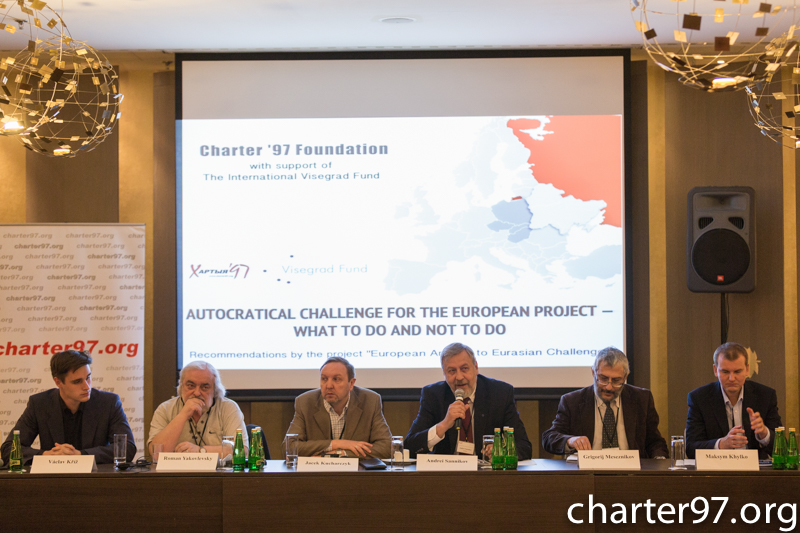
Mikalai Statkevich: Ideals and values exist, and they need sacrifices
Special guest of the conference “Charter-97” in Warsaw was Mikalai Statkevich, the leader of the Belarusian opposition. The former political prisoner said that the EU’s turn from the policy of values to the policy of cooperation with the illegal regime in Belarus - is not only immoral, but also irrational from the point of view of preservation of Belarus as an independent state. “I am grateful to the organizers for the opportunity to speak before you. I flew to Warsaw from Brussels, where I attended a meeting of the leaders of the opposition parties with members of the European Parliament and representatives of the European Commission. The topics of our discussion are in tune with the theme of this conference.
In our opinion, the EU’s turn from the policy of values to the policy of cooperation with the illegal regime in Belarus – is not only immoral, but also irrational from the point of view of preservation of Belarus as an independent state. The reason why the Belarusian regime still exists - is Russian support. Without this support, the existing model in Belarus would be impossible.
Russian subsidies to the Belarusian economy are enormous. During some years, it amounted to 25% of the Belarusian GDP. Mr. Lukashenko has made several attempts to eliminate the independence of Belarus in exchange for money. He has been stopped only by the Belarusian society. Tens of thousands of people, in spite of the repression, took to the streets to protest.
European politicians think that by their political and economic help they will save the independence of Belarus. However, Russia has powerful leverages – it would be enough just to introduce the world energy prices for Belarus. The guarantee for the independence of Belarus is not Lukashenko, who has been doing everything to weaken the independence for the last 20 years. Guarantee for the independence - is the Belarusian society, its willingness to defend their country. We have seen an example in Ukraine, where political and economic elites have managed to raise a generation of patriots. In contrast, in our country, Lukashenko did his best to prevent appearance of such generation. On the contrary, all Belarusian is being destroyed and persecuted.
Now we see how European politicians turn to the Belarusian society and say: there are no ideals, no freedom, at least, for you. Engage in your personal life, survive, flee from the country, you do not need any ideals. This is bad. European politicians meet with a man, considered a criminal and murderer by many in our country (and by me personally). They shake hands with him, accept him as a legitimate president. At the same time, we are told that it is all done for us, for the leaders of the opposition. It is like: look, Statkevich, here you are, released from prison, fined 11 times, but not planted again. We in this way ensure your safety and freedom.
However, if my personal safety had been my primary goal, I would have behaved and would have lived differently. Our goal - is the freedom, for the sake of which it is possible to make sacrifices. When Lukashenko receives the desired from the West, they will remind me all those 11 penalties and send me back to the same place.
The Belarusian democratic forces currently have no choice but revive and maintain the faith in the ideals, sacrificing their own safety. I would like to thank all of you, who think about our country, help us, spend personal time and a piece of life in order to help us. This is also a proof for the Belarusian people that ideals and values exists and are worth sacrifices”, - said Nikolai Statkevich.
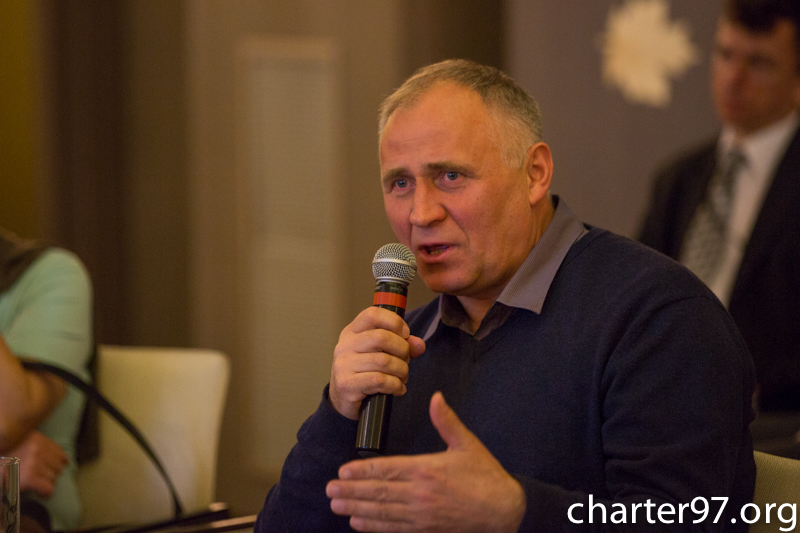
Joerg Forbrig: By supporting Lukashenko we will not achieve stability in the region.
“Today, we are in a situation, in which, first of all, we should strengthen our defense against Russian Federation in order to close the ways and weaknesses through which the Russian government is trying to manipulate our countries, politics, business and society. This should be the priority”, - said Joerg Forbrig, director of the Fund for Belarus Democracy at the German Marshall Fund (US).
The expert is confident that the confrontation between the West and Russia will continue:
“It will last for a long time, and we need to be prepared to protect ourselves in order to survive. But it seems to me that in Germany, Western Europe, the Visegrad countries, they are not very much aware that a confrontation - is a broader issue that goes beyond the crisis in Ukraine; and it takes long for them to respond. Today, Visegrad countries should be natural partners for Belarus and Ukraine on the path of reform and democratization. But we can see that currently these countries themselves, for example, Hungary and Poland, experience very complex political processes, many of which are critical. In my opinion, it is strange that the Visegrad is no longer a major partner of Belarus. Other partners are being looked for. I was interested to hear that many Belarusians speak about Ukraine as a new partner. Our first priority should be to strengthen the security, the second – to help Eastern partners such as Belarus and Ukraine to protect their independence and society from the pressure from Russia.”
Joerg Forbrig acknowledged that today there is a conflict between pragmatism on the one hand and values on the other.
“Many people say that Europe has betrayed its values and is guided by the geopolitical considerations that the most important today - is the independence of Belarus, not its democracy. Many have criticized Europe for the choice of the pragmatic way, and I agree with this criticism. Cooperation with the Belarusian regime can maintain country’s stability in a short term, but in a long-term it will not work. It does not lead to positive change and stability in the region”, - says expert.
The director of the Fund for Belarus Democracy at the German Marshall Fund (US) believes that the EU's cooperation with the dictator Lukashenko may lead to the fact that “the EU will lose trust among Belarusians.”
“It does not give the result: we have already seen an example of Ukraine, when the EU cooperated with President Yanukovych but, in the end, did not support him when Ukraine appeared under pressure from Russia.
The same thing is seen in Belarus. Today, we use the geopolitical argument to cooperate with the regime, but in a situation when pressure from Russia rises, we will not support and protect Lukashenko. So why do we use this geopolitical argument, if in the end we will not implement it in terms of the protection of the regime and independence of Belarus?”- the expert asked.
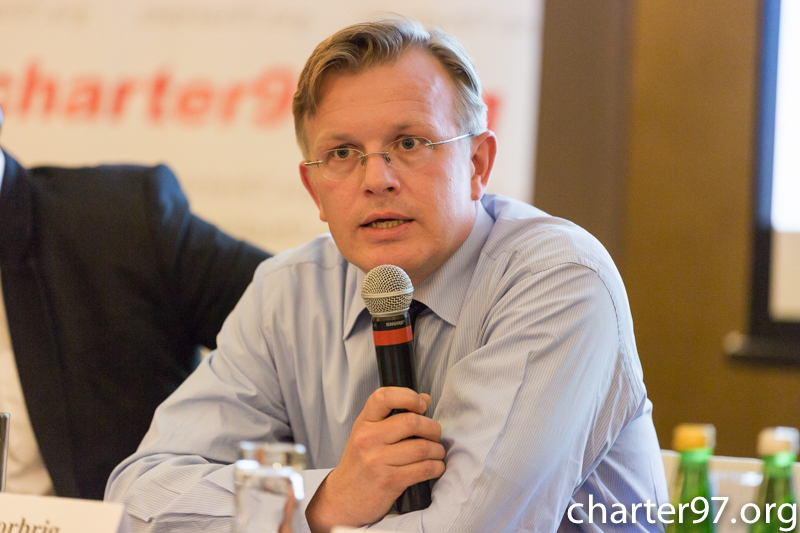
Istvan Gyarmati: Russia has never been so weak as it is now
President of the Hungarian International Centre for Democratic Transition, ex-Minister of Defense of Hungary, Ambassador Istvan Gyarmati believes that one of the main problems is the lack of normal experts of the EU and the United States who can explain to politicians what to expect from Russia:
“We all know how Russia was acting during the last 200 years, and likely it will be acting the same way during the next 200 years. But the problem is that Europe and the United States are not always aware of it. See what security and defense experts said 25 years ago and what they say now. Can you name me at least one serious expert on Russia in the Obama administration? I do not know any. And in the EU, is there any normal experts on Russia? No.
I think that one of the problems is that there are no normal experts who can explain to politicians what we can expect from Russia. And even if there were such experts, they would unlikely be listened. The last European politician, who was aware of what Russia is, was Bismarck. Modern Germans love Russia, believe that it is beautiful, that there is a certain level of democracy and that it is our ally ...
Meanwhile, Russia has never been so weak as it is now. Dictatorship in Russia intensifies and spreads beyond its borders. Oil prices are falling. At the same time, Russia is testing our will. The intention of Russia is the occupation of the eastern part of Ukraine if the country gets closer to Europe. What should be done? You must apply efforts to stop Russia's soft power and influence on Europe. Russia is now trying to give its response to the expansion of NATO, it is trying to use this extension as a provocation.
The first thing we need to do – is to deal with the crisis related to migration, as it represents a major threat and has an impact on the internal situation in the EU. We have to fight with problems within us, not with Putin.
But let us return to Belarus. Belarus is a victim of this situation. The Europeans are trying to be friends with Lukashenko for two reasons. First, they think that if they are friends with him, it will lead to improvement of the level of life of the Belarusians. In fact, it will not. The second reason is more interesting and more serious. There is a situation, when the strategy and values contradicts each other. The strategy is to keep Belarus outside the Russian orbit, which implies pulling it towards the European Union and the United States. Anyway, this is only a temporary situation. The fight for the values cannot be to stopped.”
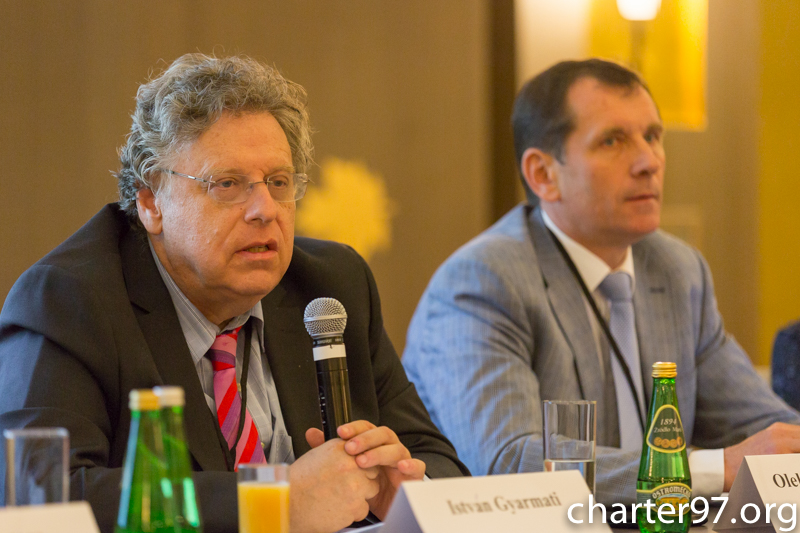
Zmitser Bandarenka: Termination of the support of independent media would be an invitation for Russian troops to Belarus
The coordinator of the civil campaign “European Belarus” Zmitser Bandarenka said at the conference about the danger of withdrawal of the democratic countries’ support to the Belarusian democratic projects:
“We are now faced with a decline of the support to Belarusian projects, including information media, located in Belarus or abroad.
We are grateful to the Polish government for the fact that it remains to be principled and continues supporting Belarusian independent media; but the projects are usually complex and are not supported by only one country. Despite the sharp political struggle, both PiS and PO politicians are over the years united in the support of the Belarusian projects.
During the recent years, we often hear that we need to actively fight against Putin's propaganda. However, at the same time, we are faced with a situation when the assistance to the independent media is terminated. These approaches are illogical: it turns out, that in order to fight against Putin's propaganda, you need to close or significantly reduce support to the Belarusian independent media. This is a very strange message.
Of course, there are many successful examples of how the Polish and Swedish Governments, and German Marshall Fund (US) support the Belarusian information projects, but we are talking about a common danger.
Friendship with Lukashenko, or at least the desire to improve relations with Belarus as with a transit zone, goes hand in hand with the desire of the Belarusian and Russian authorities to achieve the withdrawal of EU’s support of the independent media.
This is very dangerous. Termination of the support of the Belarusian independent journalism would be an invitation for Russian troops to Belarus, as, although public opinion is against Lukashenko, Putin, unfortunately, is very popular there. Only the Belarusian independent media, such as “charter97.org”, „Belsat”, „Radio Racyja”, „Nasha Niva”, „Narodnaya Volya” and some others, oppose Putin's propaganda.
According to sociological surveys, more than a half of Belarusians support Russia's annexation of Crimea and its invasion of Donbass. In my opinion, this is due to the fact that there is a news hole, and Lukashenko's media do not protect independence. Only independent media and Belarusian opposition are the guarantors of the preservation of the sovereignty of Belarus”.
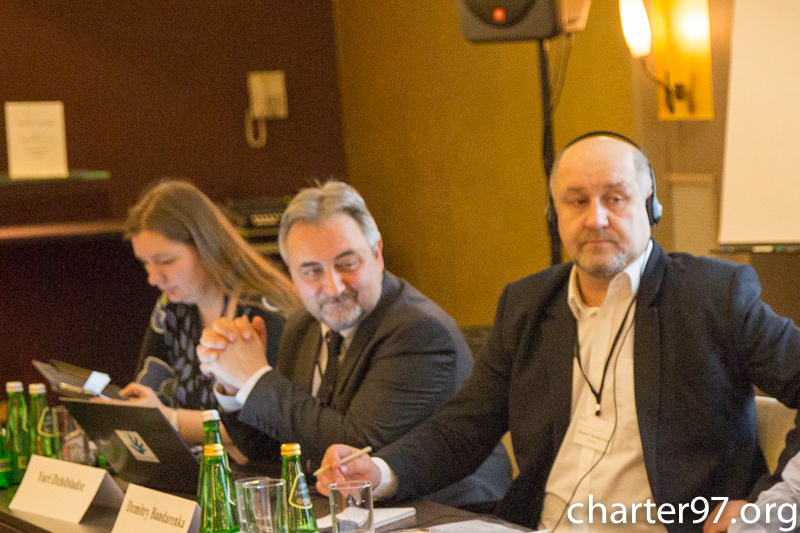
Pavol Demes: Human rights are more important than politics
Pavol Demes, former Minister of Foreign Affairs of Slovakia, a member of the German Marshall Fund (US), believes that Belarus has always raised a lot of questions in the European Union.
“The authoritarian regime there is of a different type than in other countries, with which the EU develops a relationship. Belarus is a dilemma for the EU. There were tried techniques of isolation and sanctions, which are now canceled. The EU is now starting to develop relationships in a different way.
Many Europeans understand that the political situation in Belarus has not changed, only the EU’s approach to it has changed. I think it happened for two reasons: the first - Russia's policy in the region and the military conflict in Ukraine, the second - the situation in the EU, the problem of refugees and a referendum in Britain. I think a combination of these factors led to a change in EU’s policy towards Belarus.
From the perspective of human rights and democratic standards, it is wrong, as Lukashenko did not make the steps that the EU expected from him.
From my point of view, there are no enough arguments to explain to people, struggling for human rights in Belarus, why the EU lifted sanctions against Lukashenko. Pragmatics, politics, geopolitics - is not an explanation. I belong to a group of people, for whom human rights are more important than politics.”- said Pavol Demes.
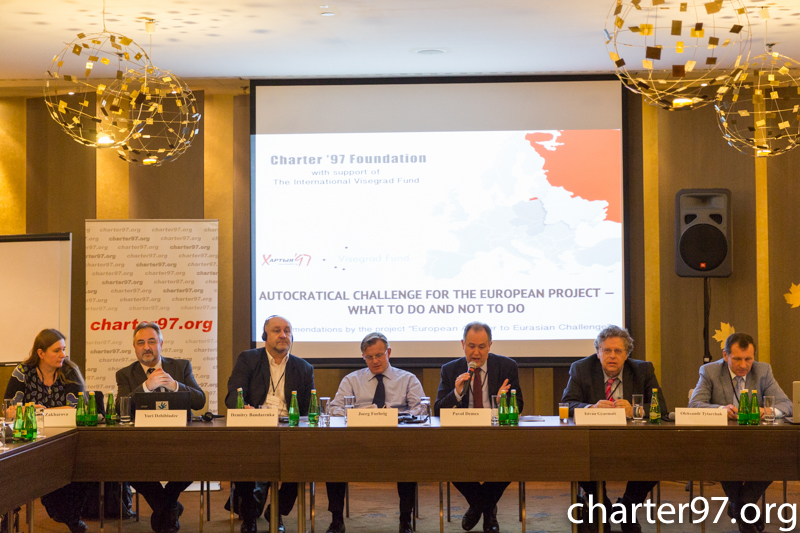
Jacek Kucharczyk: We must defend European integration and the values of democracy
Jacek Kucharczyk, the president of the Institute of Public Affairs, believes that EU’s civil society must unite to defend European integration, values of democracy and the rule of law, as well as the EU commitments to protect these values in the East.
“In case of Polish foreign policy after the arrival of the new president and the new government, we can observe obvious elements of continuation, which I evaluate positively. In particular, there is a desire to strengthen the NATO presence in Poland and Eastern Europe.
But there are also some changes. Foreign policy is now strongly influenced by the domestic politics at various levels. The Polish view on relations with the European institutions, important European partners, in particular Germany, has also changed. There has appeared another political philosophy: the current government focuses not on the construction of an international network of partners, but on the domestic sovereignty. There is the so-called conservative revolution. This is a concern, as it is exactly what Putin wants.
All this will have implications for Poland's capacity to influence the Eastern Policy. Unfortunately, a lot of things are done in order to start the discussion with the previous government, but not in order to lead to some positive policy changes.
Regarding the Visegrad cooperation - there are a lot of contradictions. When the Polish opposition came to power, the previous government remained attentive to the relationships between Russia and Ukraine. Now it seems that, due to its actions in the Visegrad, Poland went to a secondary role in relation with Russia. However, this is not the case, as the sanctions were imposed on Russia.
The consequence of the refugee crisis was the fact that the four countries of the Visegrad Group opposed Germany in relation to how to resolve this crisis and reorganize the foreign policy with regard to regional issues.
Poland was an example of a successful democracy and an example of successful EU enlargement. The European policy can face the crisis, in particular, in terms of values. I do not really understand what to do in this very difficult political situation. I think we should organize a parallel network of the Visegrad, which would protect the European integration and the values of democracy and the rule of law, as well as the EU's obligations to protect these values in the East, as now pseudo-patriotism seems to be the dominant approach” - Kucharczyk said.
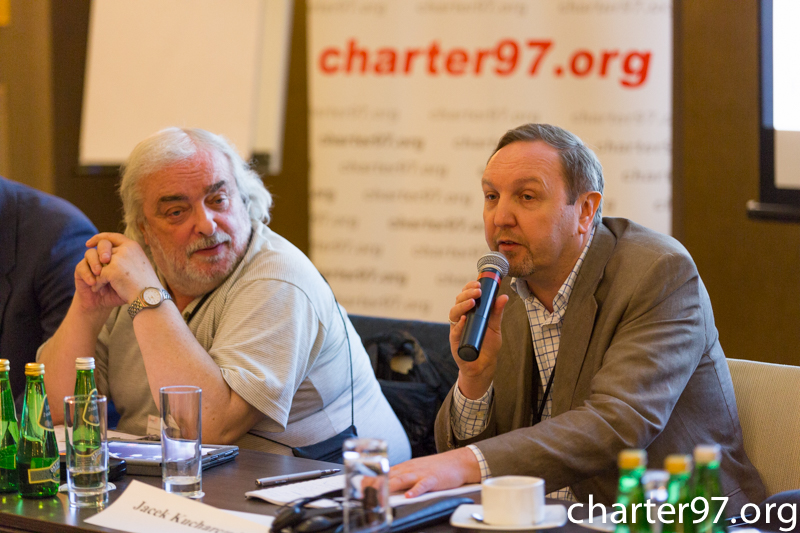
Maksym Khylko: Stability of authoritarian regimes is unpredictable
Head of the Board of East European Security Research Initiative Foundation (Ukraine) Maksym Khylko has noted in his speech that the failures of the EU neighborhood policy are not caused by the excessive emphasis on European values, like many in the European Union mistakenly believe today. The weak points of the neighborhood policy are - attempts to apply the same policy for very different countries with a different vision on the future of its relations with the EU; lack of motivation for the partner countries; EU’s failure to adequately assess the Russian factor.
“Values are not a problem. The problem is the lack of ability to effectively protect and promote them. But, unfortunately, in Brussels, the prevailing view is that it is necessary to sacrifice values for the sake of illusory stability and pseudo-pragmatism. In a joint statement on the revision of the neighborhood policy, presented by Federica Mogherini and Johannes Hahn on November 18th, 2015, the values are pushed into the background, when the issues of democracy and human rights are invited to be discussed with partner countries “in a mutually agreed format”. One can imagine the scope of the format proposed by authoritarian regimes in Minsk and Baku.
Hopes of the EU that it will be possible to buy a security and stability at the expense of property is not justified. „Stability” of authoritarian regimes is unpredictable, as showed by the events of the Arab Spring and Euromaidan. Real security guarantees cannot be given to Lukashenko either, as Putin will not ask him for permission if he decides to use the territory of Belarus to create the threat of EU and NATO countries.
Instead of investing in authoritarian regimes in search of temporary and deceptive stability, it would be more pragmatic to stimulate democratic reforms with effective tools, including both incentives and sanctions. Such tools include: support of the development of civil society, non-governmental organizations, free media that have proven to be effective, such as the „Charter-97” and „Belsat”, active involvement in the implementation of the Eastern Partnership the Visegrad Group countries, for which the EP supervision would be the opportunity to prove their maturity and influence on the European space. Pragmatism is needed not as a substitute of values, but as a promoter of them”, - said Khylko.
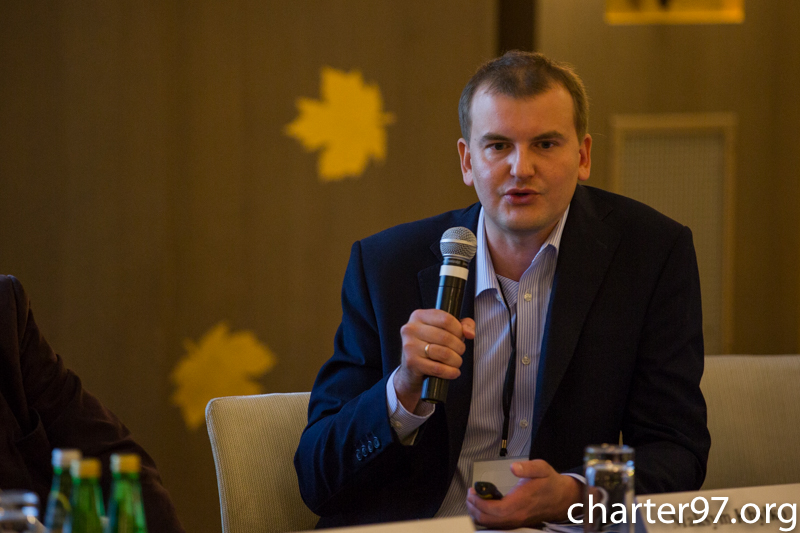
Olga Zakharova: To qualify for a credit, Lukashenko must present a real democratization
Olga Zakharova, Russian human rights activist, representative of the Working Group of the Investment Committee on International Control over the Human Rights Situation in Belarus, said that the most important thing today – is to continually emphasize the importance of the return of value approach to the EU’s policy towards eastern neighbors.
“Moreover, it is important to show that pragmatism is not some short-term situational alliances, but the long-term policy towards promotion of European democratic values.
During the project „Charter-97” situation in the European Union has dramatically changed. It is dynamic, not static, and we see that even the European project, as an idea, is under threat, because right or left populist sentiment take precedence in a significant number of countries.
The EU is at risk, coming primarily from the south; however, we cannot forget about the eastern neighbors, as they may become our terrorist support in the region. Only a democratic society with a replaceable, accountable authority can be regarded as a stable one.
As soon as countries begin to slide into illiberal democracies and then into authoritarianism, we have a whole set of instability that could eventually become a threat to the security of the entire region. When people do not have access to normal justice and cannot legitimately communicate their needs and complaints to the authorities, society begins to radicalize.
This perspective is a very long, and it must be seen. The horizon of any policy planning is short enough. Sometimes the first approach is tried, as it was with Belarus, then, when it turns out that it does not work, all is „put away” and another approach is tried: the sanctions are imposed, they didn’t help and were lifted, and etc. Now we are afraid of the short-sighted approach to Ukraine,” - says Olga Zakharova.
According to Olga Zakharova, any cooperation with dictatorships must be strictly conditional.
„The main idea of the Eurasian offers: integration on the conditions that the ruling clan remains in power. It is not the society that matters, but the state governors. The change of power is the most terrible evil. Accordingly, the answer should be principled - if we cooperate, we do so only under certain conditions. For example, to get a loan, Lukashenko must present a real, rather than imaginary, democratization of the situation in the country. If Aliyev wants to build a pipe, he should release all political prisoners and carry out certain reforms.
We must work also with the society. If the EU is a democratic project, its partners should be not only the authorities and their front organizations, but also a real civil society”, - said Zakharova.
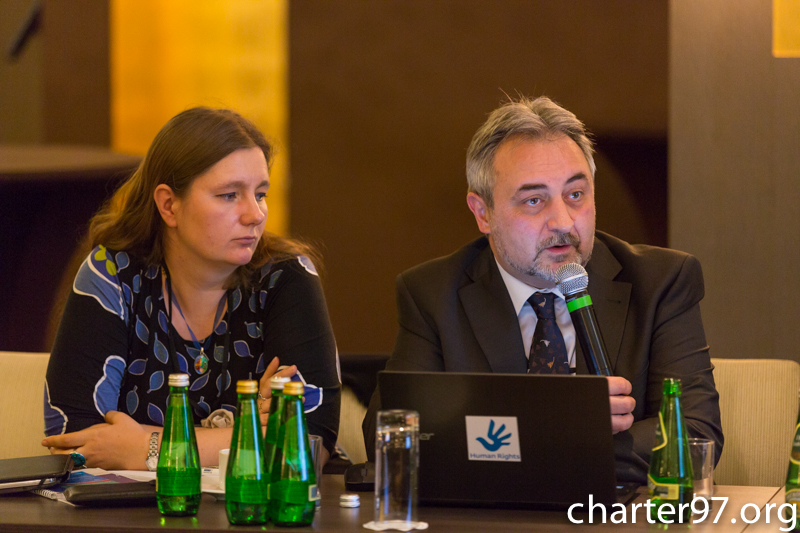
Oleksandr Tytarchuk: Moscow is preparing a scenario for a kind of a hybrid piece for the West
Oleksandr Tytarchuk, associate expert at the Foreign Policy Research Institute by the Diplomatic Academy of Ukraine of Ministry of foreign affairs, spoke at the conference on „The constant external stimulation, fueled by domestic problems, as part of the Russian scenario of the hybrid world for the EU.”
„The internal problems in the EU should not be considered solely in the context of the EU itself. These issues are closely connected with the situation around the perimeter of the EU and its confrontation with Russia, which has positioned itself as a close to the EU country. The perimeter itself remains a crucial stabilizing factor, the maintenance of which is not needed for Moscow that prepares a scenario of a kind of a hybrid piece for the West and, later, hybrid war for the countries of the so-called „common” neighborhood region, that has all chances to become a “common use” region for the West and Russia.
Hybrid world scenario for the EU Member States is based, primarily, on the use of Russian weaknesses and problematic issues, their artificial exaggeration and constant stimulation, as well as obstruction of the search for and implementation of a global system solutions. These solutions form the basis for the successful overcoming of contemporary crises. A systematic approach is closely linked to the existing European values, norms and principles, that Kremlin does not intend to recognize in the near future. The main value for modern Russia is the war, which became a means of solving all existing conflicts in the context of establishing a new world order in the old system of the Yalta-Potsdam coordinates.
The fallacy of the so-called „pragmatic” approach of the West to the question of common values and interests within the framework of dialogue with Russia is becoming more apparent. Values define the action strategy of the West and Russia, and the interests influence the choice of tactics within the framework of the current situation. Thus, the proposed option of cooperation has purely situational and short-term nature, which completely suits the Kremlin and is extremely disadvantageous to the West.
As a follow-up opposition to the Russian scenario of the hybrid piece with the EU, it is proposed to primarily focus on the protection and development of the existing system of European values, norms and principles, which are the basic elements for the strengthening the EU as a whole. The decisive condition is the support of the democratic reforms in the countries of the „common” partnership, including Belarus. The engine of this support should be the Visegrad countries, that can in this way make their contribution to the strengthening aspects of values and unity within the EU. At the same time, besides the EU and Russian interests, in order to avoid „unexpected surprises”, one must consider the interests of „intermediate zone” countries, that form a model of a „general” neighborhood area and are forced to accept a „limited co-existence” rules with Russia against the background of its hybrid war„ - said Oleksandr Tytarchuk.
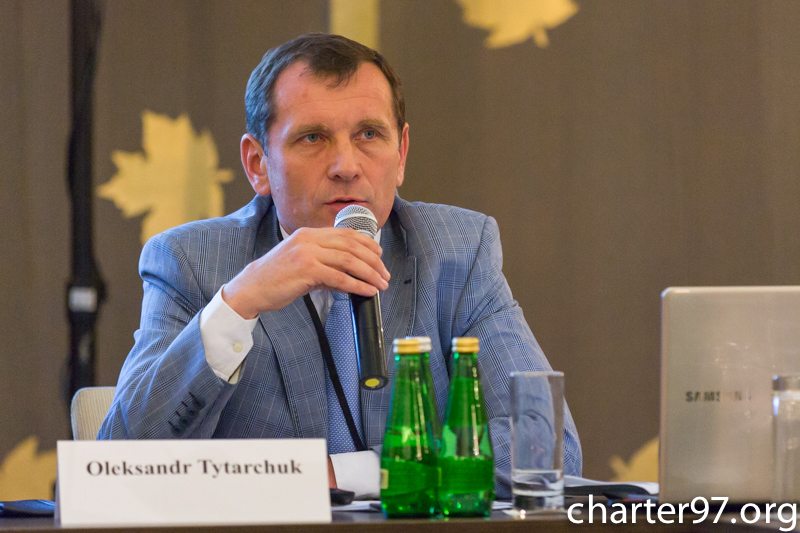
Grigory Mesezhnikov: It is not the concessions that are needed, but the statements of clear positions and more decisive actions of the EU
Director of the Institute of the Slovak social problems, Grigory Mesezhnikov, believes that if Europe is really concerned about its future and thinks of solutions not in terms of ordinary, daily tasks, but in terms of the next few decades, its response to Russia cannot be the acceptance of the logic of the strategic rival, that is converting to the enemy dreaming of EU’s weakening and, if possible, elimination of its valuable foundation.
„When in 2009 at the summit in Prague, the EU announced a new initiative “Eastern Partnership„ as part of its neighborhood policy, a large part of the European political elite viewed it optimistically. Polish-Swedish initiative, which was launched during the Czech EU’s Presidency, represented the united Europe’s interests in the continuation of the policy aimed at supporting the internal changes in the Eastern European countries, particularly in reforms that will bring these countries closer to the EU. Although the initiative did not contain a direct promise to take these countries to the European Union, the logic of the launched initiatives (reforms in the spirit of European values and in accordance with the basic characteristics of the social structure of European liberal democracies) makes it clear to understand that, unlike other similar initiatives, the Eastern partnership is dealing with the states, that, due to their geographical location and cultural and civilizational component, have, firstly, a very real prospect of joining the EU, and secondly, the ability to achieve acceptance in a community in the event of success in the reforms implementation.
What do we have today in the Eastern Partnership? Sure, there are noticeable achievements: first of all, the three signed Association Agreements, the development and launch of the socio-economic reforms, the implementation of programs of bilateral and multilateral cooperation. But there are also real problems and shortcomings. The initial enthusiasm disappears, the European political elite, faced with the new challenges, were not sufficiently prepared to answer them; it concerns also challenges related to the Eastern Partnership. And although we cannot say that the Eastern Partnership as such is stalled and is not moving forward, it is clear that the initiative itself needs a serious restart, which should bring a new flexibility, efficiency, ability to cooperate with individual countries by taking their specificities into account, and of course – only under the condition that all basic values and norms are rigorously complied with.
According to Carl Bildt (and we cannot disagree with him), today Russia has transformed for Europe from a strategic partner into its major strategic problem. This is particularly noticeable in Russia’s attitude towards the Eastern Partnership project and desire of peoples of these countries to follow the European path. The war against the Ukraine (and before that against Georgia), direct pressure on Armenia (in fact blackmail case associated with the key issue of external security of the country), the subversive actions against Moldova, the direct support of the authoritarian regime in Belarus, with direct reference to bilateral cooperation in the military sphere, directed against the West - all this in order to prevent the implementation of the European choice of the peoples of the former Soviet republics, to undermine their cooperation with the EU and possibly weaken the EU itself.
If Europe is really concerned about its future and thinks of solutions not in terms of ordinary, daily tasks, but in terms of the next few decades, its response to Russia cannot be the acceptance of the logic of the strategic rival, that is converting into the enemy dreaming of EU’s weakening and, if possible, elimination of its valuable foundation. The answer can only be strengthening cooperation and collaboration with Eastern European reformers and democrats. Not the concessions, but the statements of clear positions and more decisive actions of the EU must be the response to the authoritarian challenge of Eastern Partnership.
Not the cooperation with the autocratic leader of Belarus, but the unconditional support of Belarusian democrats, opposition politicians and civil society activists is needed. Not condoning of the Russian geopolitical game against Ukraine, but the unconditional support of Ukrainian reforms and the continuation of the sanctions against the Kremlin until the complete elimination of the consequences of Russian aggression - the annexation of the Crimea and the capture of the Donets Basin. And, of course, we should consider statement of clear prospects of EU’s membership to the States seeking to join it and successfully conducting reforms. Only in this case, the Eastern Partnership initiative will be able to gain a new dynamic it needs.”
